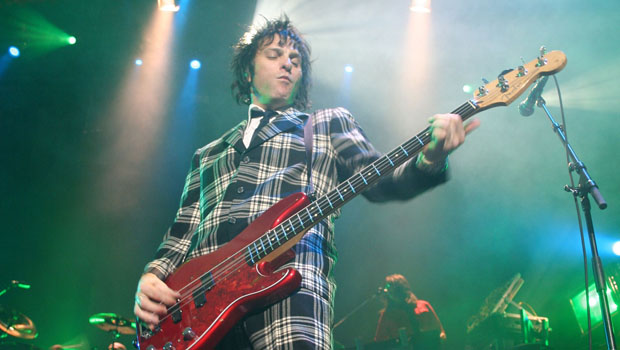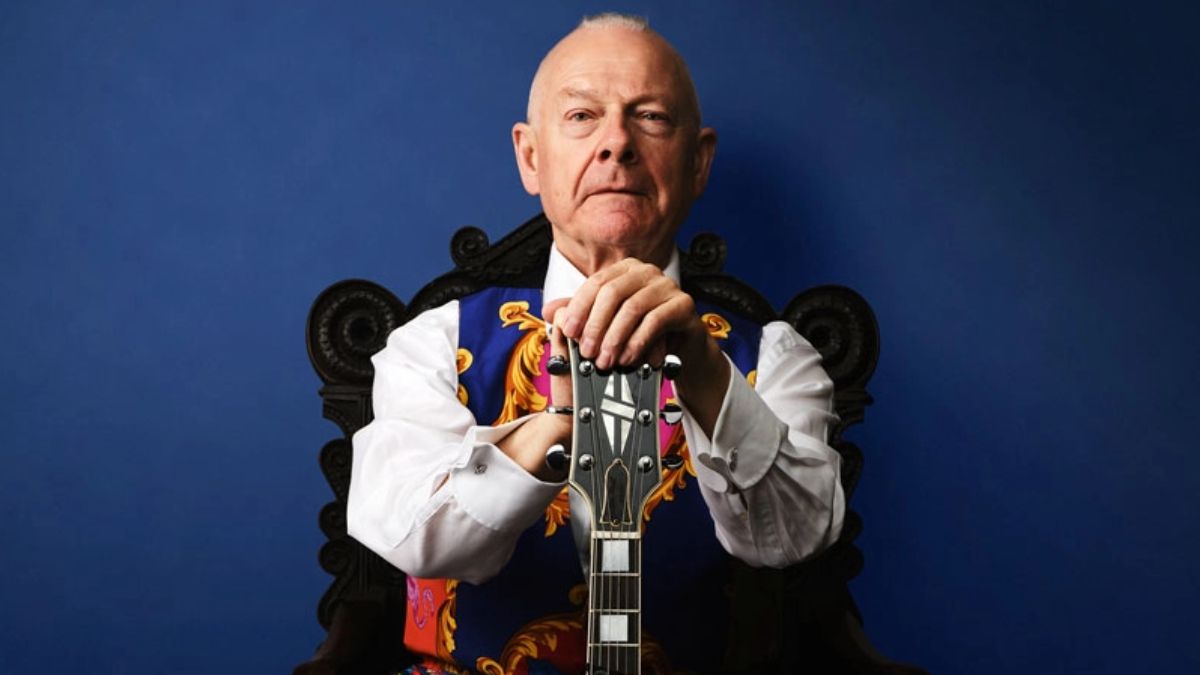
In a recent piece by Rolling Stone, Tommy Stinson was accused by former Replacements bandmate Paul Westerberg of being more aggressive toward a reunion of the band because he "needs a gig," to which Tommy replied: "That's funny. I got fucking three or four gigs going at any one time."
And it's true. Stinson will release his second solo album, One Man Mutiny, on August 30, right before a run of headlining shows in Central and South America with a little band called Guns N' Roses in October. Add that to pulling bass duties in Soul Asylum and it's a wonder Tommy even has time to field questions about a Replacements reunion at all.
That said, Tommy did manage to take some time out of his schedule to catch up with us about his new album, which is being released on his own Done To Death Records and will see half of the proceeds from sales go to Timkatec, a nonprofit for Haitian relief. Check out the chat below, and you can find out more about Timkatec here.
So it's been seven years since your first solo album, Village Gorilla Head. What made now the right time to do another one?
Well, for one I forget it was seven years. That's a long fuckin' time to wait to put out another record. I guess I've been busy! Basically that's it, I would have put another one out sooner if I had the time to sit down and write one, but I've been touring with Guns a lot and doing stuff with Soul Asylum and I now I have a 3 1/2-year-old.
Last March we moved to upstate New York and I have a house where I can have my studio and all my stuff is set up. My goal for the future is to put them out a lot sooner than that, and if it's all in one place I should be able to put it together quicker. I kind of compile songs as time goes by and I guess if I'm real busy -- I don't really write on the road a whole lot, so I need the downtime to write.
You're also putting this record out on your own ...
All the latest guitar news, interviews, lessons, reviews, deals and more, direct to your inbox!
The big picture is that I'm putting [the album] out myself. I wanted to start doing that. This record has been the launch pad for that; creating a little place where I can put out my own records, anything I want to produce, anything I may score for a movie -- I just scored a movie a couple years back called Catch and Release for Sony; that was a great opportunity, a cool experience, and I'd love to do it again.
So this record is the start of me trying to get that going on, and I have to do a lot of things I've never done before. I have to go in the social media realm and all these other things. But it's exciting to me, because after all these years of putting out records for record companies and seeing what all they don't do and what 80 percent of the take of a record goes to do -- and doesn't get done -- it makes you kind of go, "Wow, so if I make my own record I'm kind of in control of what I do with it." It's all out of my own pocket.
And you also had a really good cause behind this record.
I wanted to raise awareness for Haitian relief. I had a feeling about it that I wanted to take care of. I wanted to use this record to promote the Timkatec School that I've been raising money for because it's a really good cause and it inspires me.
At this point in my life, you know, I've done all this crap, good or bad -- 'Mats, Guns N' Roses -- whatever you want to think about it it. For me, I'm in a position now where I can actually give back and my idea is to take the things that I'm inspired to help and use those things to inspire me to keep doing things.
If I sat here all day and tried to make records, I'd probably put my head in the sand and give it up. It's daunting, at best. And this is my way of carving out my niche and making it not about me, it's about the things I want to do with this thing that I can do.
If you start thinking about doing something for someone other than yourself, your life suddenly becomes a lot more enjoyable, I've found.
It sounds like this album was really fun to make, and in terms of your DIY ethic, it certainly shows you've embraced a new music industry model that a lot of people are still struggling to wrap their heads around.
I'm embracing it, I'm excited by it. I want to try and make my own little place. I don't know what's out there.
I'm kind of glad to see the labels -- the big guys -- go down. They don't care, they're all taking their money off the table and just going, "Okay, we had a good run. I'm wealthy, at least." And at the expense of every musician. I love seeing that go down.
How long have you been working on the songs for One Man Mutiny?
Since the last record. Actually a couple of them came from the last record. "Come To Hide" was written well before the last record and it just didn't make it on [Village Gorilla Head] for whatever reason. I guess I had too many songs in that melancholy vein but I liked it enough to hold onto it.
So a long time. I've got stuff that'll be on the next record that's equally as old or older.
What were your go-to guitars and basses for the album?
I have some good stuff. As far as guitar amps, I've got a great early '60s Supro Thunderbolt, the same one Led Zeppelin used back in the day -- whatever, I couldn't care less, but I've got it all over my record. I've got a reissue [Vox] AC30 that sounds great. I got a little '60s Gibson amp I used a lot. I got a reissue Junior from the '80s that I used for guitar.
For guitars, I've got a '60s Tele. I've got a '56 Gretsch 6120 that's my favorite guitar on the planet. My friend Richard Fortus from Guns got me this wacky stuff that's been great, like this Kelley combo amp that was the most awesome amp ever till it blew up.
For bass I've got a bunch of reissue P basses. I used a '63 P bass for a lot of the Soul Asylum gigs. All the reissue PJ Basses I use for Guns because they have a very specific sound that's not so much Duff-like -- we're different bass players, but he's got such a distinct sound that I didn't want to come in and be like, "I'm gonna make it sound better." I wanted something that sounded similar enough because I thought it was important and his sound was great.
So your fiancee Emily makes some appearances on the album, which is new for you. At what point did you realize she was a good fit for the record?
I knew when I met her that she was a singer/songwriter and had an amazing voice. And I've been trying to incorporate that kind of vibe into my music for a long time. I always liked that quality on old Kinks records where you hear a female's voice in the back but you can't quite make it out. But it makes the choruses pop, like on "All Day and All of the Night."
I wanted to get some of that, and I knew Emily could sing her ass off, so I started slowly getting her in and singing stuff. The first song that really opened it up was "Meant to Be." I said, "What do you think of a background vocal on this?" And she starting singing, I hit record and I said, "That's it. That's what we're going to run with." She's got a great background vocal quality to her and it works out great.
So I understand the title track was the only one not recorded in the U.S. What's the story behind that one?
I recorded it with Richard Fortus and Dizzy Reed in Brussels, Belgium. The song kind of came from an incident that we had on our Guns N' Roses tour. We had an inner-bus conflict going and by the time we got off the bus that morning I was like, "Man if you guys are having a mutiny, don't include me just 'cause you've gotta bitch. When I got my issues I'm a one man mutiny!" And it just kind of stuck in my head.
One of our managers, Del James, was laughing at it; he thought it was really funny. I had the words written by the time I got to Brussels. It just seemed like something to do to get some time off, so we got a piano in the Conrad Hotel restaurant and I just set up my portable studio and we did it live. It was fun, and that was the point where I made the record from.
Tommy Stinson's new solo album, One Man Mutiny, is out on August 30. Head here for the latest from Tommy, and for more information on Timkatec, click here.
Josh Hart is a former web producer and staff writer for Guitar World and Guitar Aficionado magazines (2010–2012). He has since pursued writing fiction under various pseudonyms while exploring the technical underpinnings of journalism, now serving as a senior software engineer for The Seattle Times.

